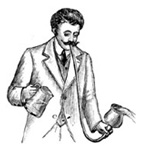
Who Really Won the Civil War?
A HOUSE DEEPLY DIVIDED
Ed. Note: We are publishing this article without editorial comment or reply. But, as always, readers are welcome to weigh in by submitting letters to the editor. See the notice on page 7 of this issue for instructions on how to do so.
Many years ago, as a gift for my fourth-grade Confirmation, my parents gave me a copy of The Golden Book of the Civil War. Adapted from The American Heritage Picture History of the Civil War, the Golden Book edition was a first-class retelling for adolescent readers. In addition to its compelling text, the volume included a rich array of photographs and paintings — particularly noteworthy were custom-designed, multi-color maps that helped make the bewildering battlefield combinations of time, location, and formations both coherent and vivid.
That welcome gift was the precursor to a family trip to Gettysburg during the summer of 1962. The book and travel became the first lessons in my lifelong study of the Civil War. Over the intervening years, that study accrued untold hours of reading and many battlefield visits. But the passing of time has done nothing to diminish the place of honor the old Golden Book still holds in my memory — and on my bookshelf. I’ve been unable to part with it, even as a gift to my sons. Even now, to thumb through its pages is to enjoy the bibliophile’s comfort of time well spent in the company of an old friend. Recently, I had occasion to renew that acquaintance, courtesy of an exchange that took place in the pages of the NOR.
During a late, post-holiday reading of the December issue, I was drawn to the discussion in the letters section about the Civil War’s contemporary legacy, particularly the editor’s replies to objections to a New Oxford Note on the removal of Confederate statuary (“Twilight of the Idols,” Oct.). The letters and Pieter Vree’s responses were clear examples of civil dialogue on a sensitive subject — but the civility of the correspondence did little to allay the diametrically opposed contentions presented in the exchange.
That divisiveness conveyed a clear impression of the war’s contemporary relevance. That impression, in turn, brought me back to my own bookshelf, where I retrieved my old copy of the Golden Book. As I browsed through its still well-preserved pages, the juxtaposition of the book’s text and photos with what I had just read in the NOR put me in mind of questions I had asked long ago, during my first reading of the text. Assuredly, these questions were no more significant than any others that might be framed by a nine-year-old boy; and just as assuredly, they failed to make the important moral distinction between action and actor. Nonetheless, the three questions represented a straightforward search for truth about the Civil War: Who were the good guys? Who were the bad guys? Did the good guys win?
You May Also Enjoy
The public square is not naked but clothed by the “woke” ideology of our bourgeois liberal elites. It has its own "church" that pronounces on orthodoxy and heresy.
Justice Ginsburg, a powerful abortion advocate, has been working for 20 years to reduce those populations she doesn't "want to have too many of."
We would do well to heed the advice of St. John Climacus, a seventh-century monk and abbot, who urged, “Flee, be silent, and pray always.”

